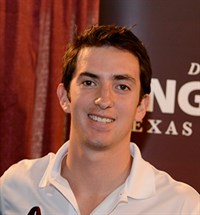 Mauricio Coen, a Ph.D. student in the Department of Aerospace Engineering at Texas A&M University, has been awarded an Aggies Commit to Graduate and Professional Student Education Experiences Fellowship. He will use the $1,500 award to help fund expenses for the A3DPT-Mars: Advantages of 3-D Printing Technology to Operations in Future Human Exploration of Mars experiment, which is part of the Poland Mars Analog Simulation (PMAS) 2017.
Mauricio Coen, a Ph.D. student in the Department of Aerospace Engineering at Texas A&M University, has been awarded an Aggies Commit to Graduate and Professional Student Education Experiences Fellowship. He will use the $1,500 award to help fund expenses for the A3DPT-Mars: Advantages of 3-D Printing Technology to Operations in Future Human Exploration of Mars experiment, which is part of the Poland Mars Analog Simulation (PMAS) 2017.
The Aggies Commit Fellowship aims to support high-impact learning experiences of graduate and professional students that go beyond required degree program activities. This fellowship furthers graduate and professional education by providing support and access to resources and programming not available at Texas A&M, and collaborative research with senior scholars at other campuses in the United States, as well as internationally.
PMAS 2017, organized by the Space Exploration Project Group of the Space Generation Advisory Council, is a realistic Mars simulation mission. The simulation will concentrate on research areas that will be important for a real Mars missions, and will allow scientists and researchers to test out innovative ideas in a controlled environment.
The project consists of two teams, astronauts and flight support. A team of six analog astronauts will conduct scientific research and record their experiences for two weeks while confined in the Modular Analog Research Station in Turza, Poland, a new habitat built by Space Garden Company in the Polish mountains. In addition, they will have a three-day lunar simulation prior to PMAS in partnership with the European Space Agency.
Fully isolated from the rest of the world, their only point of contact to Earth will be the second team at the Mission Support Center (MSC), located 530 kilometers away in the offices of ABM Space in Torun, Poland. A group of 30 international students and young professionals will make up the flight support team, supporting, supervising and analyzing the astronauts’ activities.
Coen will be at the MSC providing support for the A3DPT-Mars experiment. “The A3DPT-Mars experiment will strive to understand if 3-D printing will bring operational advantages to human Mars exploration, and quantify the differences between the current approach to space exploration and the potential for future Mars exploration,” Coen said.
While previous research has focused on what 3-D printing can create, this experiment will focus on testing a variety of operational scenarios, mostly centered around geological sampling. They will test scenarios by having simulated tool breakdowns during geological expeditions, which have to be repaired by the astronauts using the 3-D printer. The astronauts will also be able to print parts they think are necessary for improving their effectiveness during the mission overall.
They will be using an exact replica of the AMF, a 3-D printer currently aboard the International Space Station (ISS). This will allow them to compare real ISS operations with a Mars analog simulation. This replica is being provided by Made in Space, which is providing in-kind support to the experiment. Made in Space is also providing their vast expertise with 3-D printing and operations to the A3DPT-Mars team.
Coen will provide operational support to the astronauts for times when the printer stops working or they need clarification with procedures. He will also have the capability to print parts without an astronaut needing to be present. This will allow them to test the difference between Earth and Mars controlled 3-D printed operations.
“We hypothesize that astronauts will be able to adapt more quickly to changing mission goals,” Coen said. “Crew time (astronauts’ available work time) is one of the most valuable assets in any space exploration mission, and hopefully, 3-D printing embedded in their daily operations will reduce time spent in cumbersome tasks, especially with repairs.”
Coen hopes the experiment will pave the way to explore additive manufacturing technology to reduce space exploration costs.
While Coen will be the one traveling to Poland this summer, the A3DPT-Mars is being put together by an international, interdisciplinary team of students that has been collaborating for about a year. They are involved in designing 3-D printed parts, testing prototypes and creating procedures. Members of the team include Coen, Benjamin Morrell (University of Sydney, Australia), Deliya Kim (KAIST, South Korea) and Michael Muller and Sophie Gruber (University of Graz & Innsbruck University, Austria).
Dr. Greg Chamitoff, professor of practice in the aerospace engineering department, and his Aerospace Technology Research and Operations Center, are providing guidance, financial support and resources to complete this experiment.